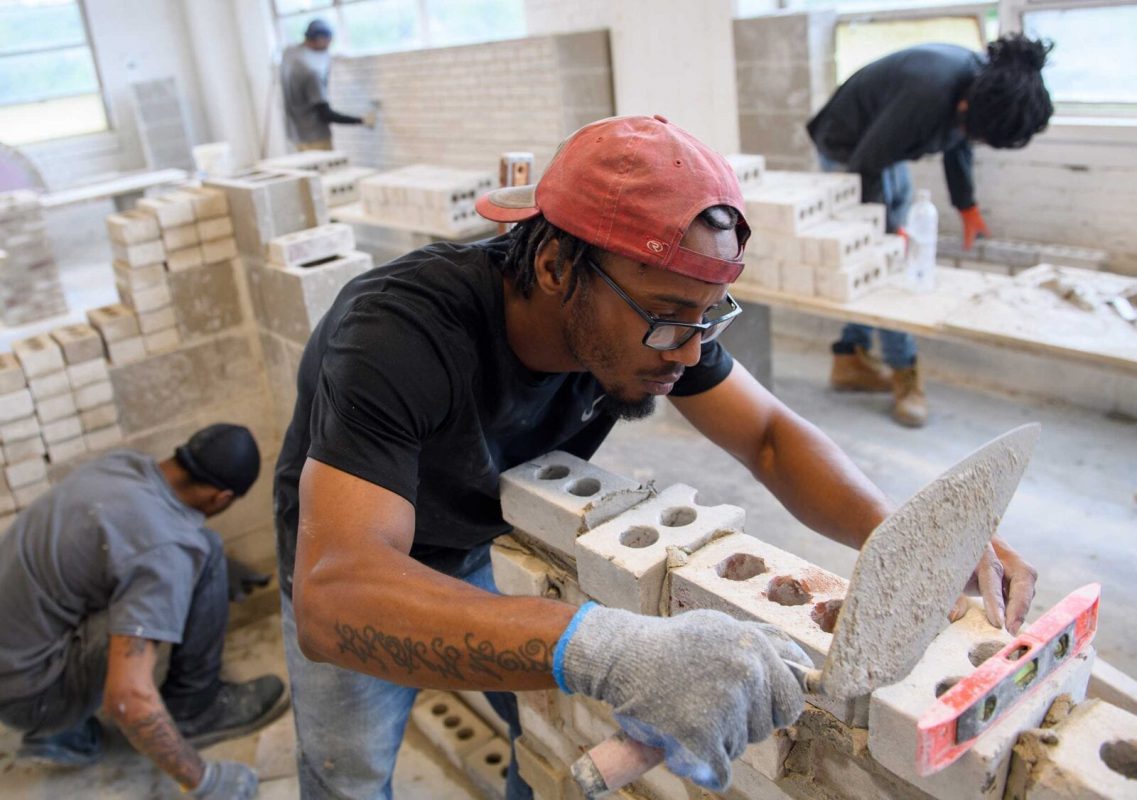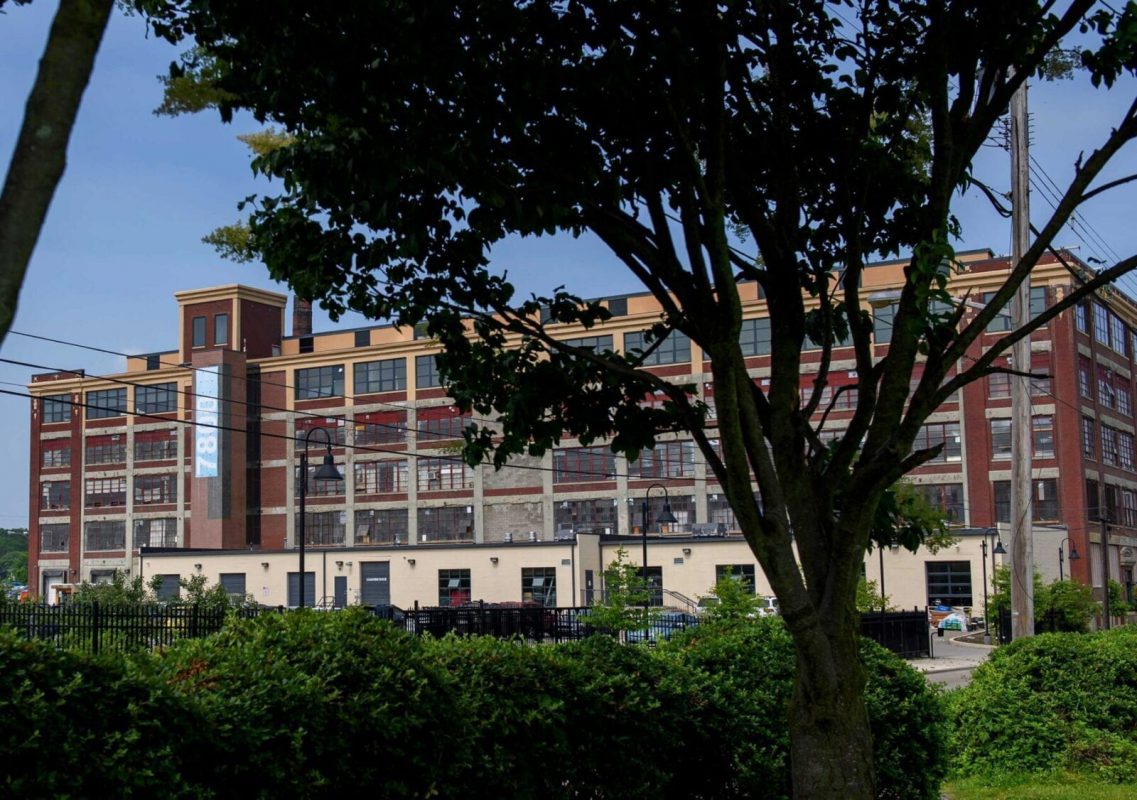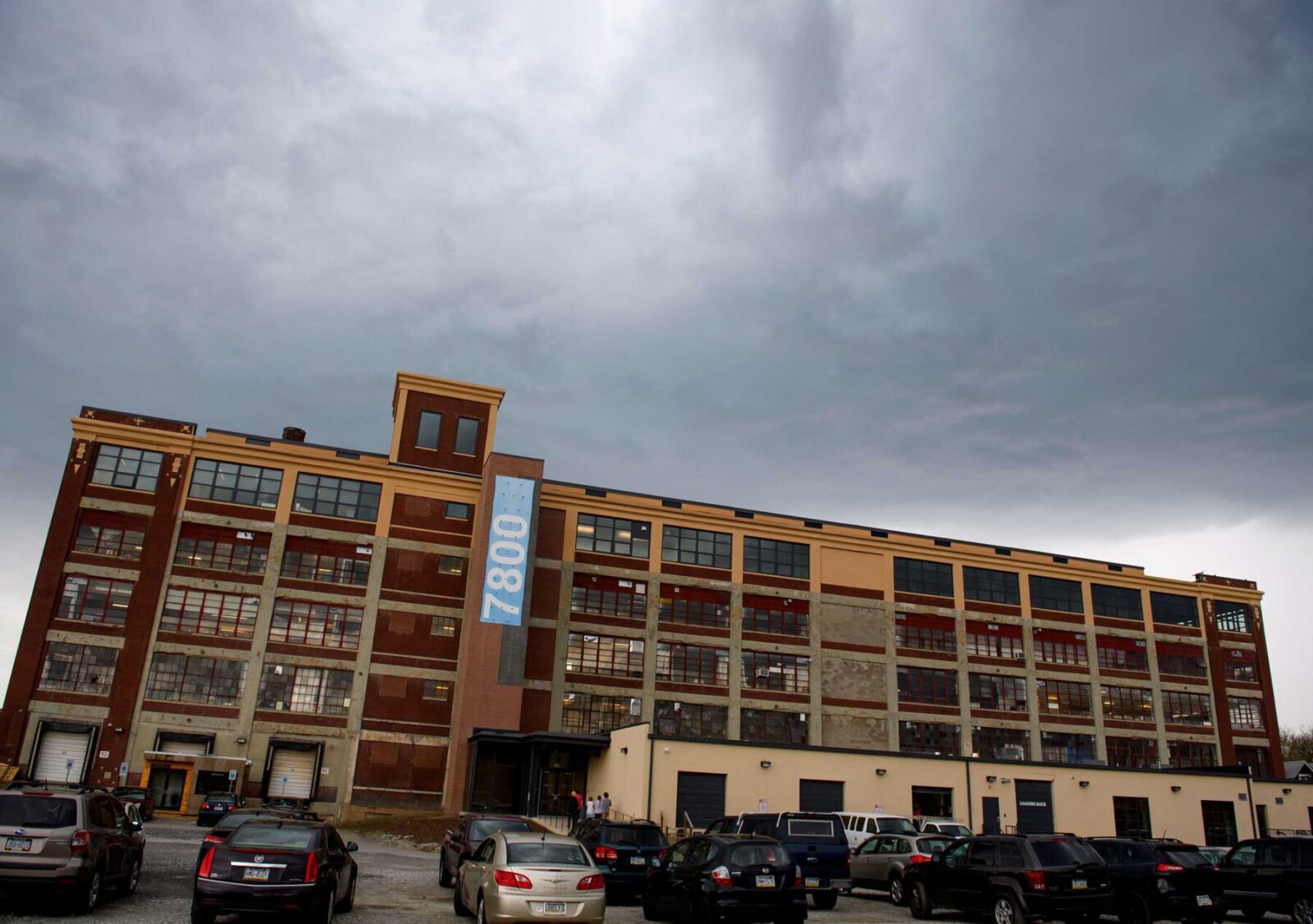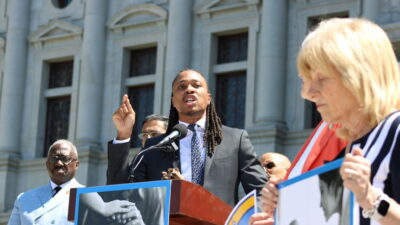Nisha Blackwell arrived with her brother at a hulking five-story concrete and brick building on a forlorn block of Susquehanna Street in Homewood.
“This place?” she asked.
To Blackwell, the building was an industrial relic of a bygone era, eerily vacant throughout most of her life. Tonight it was holding an open house for artists.
That was in 2013, when Nisha was working full-time while learning to sew at home, making hair bows as gifts for friends and family. She didn’t think of herself as an artist then, let alone an entrepreneur.
Now Blackwell makes bow ties, and her business, Knotzland, is thriving. After a $10 million renovation undertaken by mission-driven lender Bridgeway Capital, this hub for entrepreneurship includes manufacturing, and job training for entrepreneurs, makers, manufacturers, and nonprofits.
This past fall, Knotzland moved into a storefront in Wilkinsburg. Her move is a success story of how Nisha grew Knotzland from a business started in her home – to 7800 – and now activated a storefront in Wilkinsburg.
Residential and commercial investment is pouring into some Pittsburgh neighborhoods at a rate not seen for generations. Homewood, one of Pittsburgh’s most impoverished communities, is not one of them — yet. Much of its land is publicly-owned, rents are rising, and existing affordable housing is routinely lost to blight.
Through 7800 Susquehanna, Bridgeway Capital’s intent is to transform not only a building but a community.
In what may become a new model for responsible development citywide, Bridgeway’s investments in small businesses and real estate developments in Homewood extend beyond 7800 Susquehanna’s former factory walls. Bridgeway has deployed more than $2.2 million to Homewood-based enterprises.
“We were able to invest in Homewood with 7800 as a physical asset and also invest in Homewood-based entrepreneurs,” said Katherine Chamberlain, Bridgeway’s director of communications. “We’ve been funding entrepreneurs to grow their businesses in Homewood for several years.”

Bridgeway Capital was founded in 1990 by Mark Peterson in response to the collapse of Pittsburgh’s industrial economy.
Since then, Bridgeway has “provided patient, flexible capital and capacity-building services for small businesses” in distressed communities. In July, T.J. Bogdewic took over for Peterson as president and CEO.
Matt Madia, Bridgeway’s chief development and strategy officer, says Knotzland embodies what Bridgeway envisioned when they bought the building in 2013: a home for community-based craft manufacturing businesses and a hub for entrepreneurship and job training.
A $1.3 million grant from the Richard King Mellon Foundation was essential to purchase the building. Early investments from the Richard King Mellon Foundation and the Heinz Endowments attracted additional investment from PNC Bank, the Urban Redevelopment Authority, the U.S. Department of Health and Human Services, and the Commonwealth of Pennsylvania.
Elected officials, state Sen. Jay Costa (D-Forest Hills) and state Rep. Ed Gainey (D-Pittsburgh) played a vital role in securing state funding for the project to benefit the Homewood community.
Gainey believed in the potential for 7800 Susquehanna to be “a beacon of opportunity for the Homewood neighborhood in the City of Pittsburgh. Tenants will create employment opportunities, attract investment and bring renewed energy to the area,” he said.
Madia said that the company had never developed real estate before 7800 Susquehanna, and all 150,000 square feet of the building was in disrepair. Bridgeway also needed tenants that shared their vision for small-scale manufacturing—at a time when manufacturing in America was perceived to be dead.
In neighborhoods such as Homewood, outside investors must navigate the lingering effects of decades of disinvestment. Chamberlain said the learning curve was high from the outset, and Bridgeway relied on their community partner, Operation Better Block (OBB).
“OBB is a great partner of ours. We’ve worked with them on a couple of projects, and we have a strong relationship,” she said.
Madia added, “Both OBB and the [Richard King Mellon] foundation were looking at who could take this project on. Our name came up and we were excited about the challenge.”
Jerome Jackson, executive director of Operation Better Block, has worked closely with Bridgeway throughout the process, helping to link them with residents.
“Bridgeway has been really great in engaging our residents in the process,” Jackson said. “Unless residents are not attending meetings they are really well informed about what is happening at Bridgeway.
“Their redevelopment of that building was a boost in the arm for (that part of the neighborhood) because now we have one of the largest industrial and commercial spaces in our community being redeveloped and it brought a lot of interest,” he said.
Next, he said, he’d like to see housing around Susquehanna. “They have been very intentional about engaging the residents in that area who live around 7800. They’ve been a great partner.”
But there are challenges. Homewood is below citywide averages for household income, employment, education, and other community health indicators. While 7800 Susquehanna has absorbed millions of dollars of private, public and charitable investment, beyond its walls are abandoned houses, a dumpsite, and a busway and rail line that that limits access to and from the community.
T. Rashad Byrdsong, president, and CEO of Homewood-based Community Empowerment Association (CEA), said that Bridgeway’s investments are “a good start,” but said he hopes to see more “in-depth investment,” that connects business development, job training, and housing development to the regional economy. New affordable housing is being built in Homewood and more are planned, but Byrdsong asked: “What’s the use of building houses if the people don’t have jobs to buy or fix the house?”

Steve Shelton agrees.
“Get someone a job first,” said the executive director and founder of the Trade Institute of Pittsburgh (TIP), another 7800 Susquehanna tenant. In TIP’s loud and energetic studio, students sling mortar and lay courses of brick as part of their masonry training program.
Shelton said this sort of thing can’t just happen on the third floor of any building.
“What Bridgeway did here is incredible. We’re standing on twelve inches of poured concrete,” Shelton said.
To Shelton, TIP is about more than masonry. “We can learn a lot about these guys by putting tools in their hands,” he said.
Upon graduation, a few will be placed directly into skilled masonry jobs “because they’re that good,” but others will go into an advanced paid welding program TIP runs off-site, or other construction jobs. TIP places more than 90 percent of its graduates, about 80 percent of whom were incarcerated, Shelton says.
TIP addresses many of the barriers formerly incarcerated people face, including insufficient credit, no recent job history and a lack of computer skills.
“Eighty to ninety percent of the job applications are online. Computer literacy is a big piece,” Shelton said. Through a partnership with Computer Reach, TIP students take classes with an “Apple Genius” and receive a completion certificate and a laptop.
TIP is now taking on housing. Finding housing to rent can be difficult for someone with a criminal record.
“I’ve got guys going with first month’s rent, last month’s rent and security deposit in their hands, and they’re getting turned away,” Shelton said. Because “these guys can’t go from jail to paying $1,000 overnight,” Shelton started looking for ways to develop temporary housing for TIP students while they sought out something more permanent.
“After I looked all over the city, I found what I was looking for a block away from here,” Shelton said, pointing through the window. TIP purchased a dilapidated duplex that, once renovated, will house up to ten students. They’ll be Zinna Scott’s new neighbors.
Scott is a lifelong Homewood resident, an active member of OBB’s board of directors, and a supporter of Shelton’s housing plan.
“Steve comes to the community,” she said of the trust that he’s built. To one resident opposed to TIP students living in the community, she said, “It could be your family.”
According to a 2016 Annual Survey of Entrepreneurs, only 5.7 percent of Pittsburgh businesses are minority-owned — the lowest of the fifty most populated metro areas in the U.S. San Jose, Calif., topped the list with nearly 40 percent.
Bridgeway’s commitment to this reality extends beyond 7800 Susquehanna.
Since its inception in 1990, Bridgeway has made 1,408 loans and deployed more than $193 million in western Pennsylvania, 81% of dollars lent are to businesses and real estate developments in low-income communities. And of the total, $50 million has been lent to women-owned businesses and $30 million has been lent to African-American owned businesses.
Ma’at Construction, Byrdsong’s company, is one of them. A general contractor for interior renovations at 7800 Susquehanna, his organization provides construction training throughout the year. Byrdsong said Ma’at achieves more than 80 percent minority participation in all of its contracts, something Madia said Bridgeway wouldn’t have been able to do on its own.
Bridgeway Capital is a community development finance institution (CDFI). CDFIs include banks, credit unions, venture capital and loan funds designed to help small business owners overcome what Byrdsong said are structural barriers — including racism, blight, lack of access to traditional lenders, and the disproportionate impacts of the housing market collapse — that become a “plague” on communities like Homewood.
CDFI money comes from many sectors of the economy, including the federal government, philanthropy, private-sector banks, and investors.
West of 7800 Susquehanna is a three-block strip of mostly vacant or blighted land. Bridgeway bought most of it and hired Urban Design Associates to develop a community-based redevelopment plan for it. Madia said it will address three primary goals: employment, stormwater management, and better connectivity to adjacent communities.
John M. Wallace, Jr., Ph.D., senior pastor of the Bible Center Church, is committed to community planning efforts in his native Homewood neighborhood. As board president of Operation Better Block, he especially values the community engagement in his organization’s recently completed land use vision plan for Homewood, known as a “cluster plan.”
“Absentee landlords of substandard, government-subsidized, rental housing continues to be a significant problem, with tremendous impact on property values, blight, abandonment, and crime, both real and perceived,” Wallace wrote in an email.
Wallace acknowledged Homewood may be experiencing “planning fatigue,” but noted its importance with regard to development with meaningful community benefits.
“I am hopeful about the future of Homewood but I recognize that those with capital to invest will have a disproportionate say in the development of the community, at times, irrespective of the desires and aspirations of residents and other key stakeholders.”
As the David E. Epperson endowed chair at the University of Pittsburgh’s School of Social Work, Wallace primarily supports community growth through education, innovation, and entrepreneurship. Through his church’s community and economic development division, Wallace founded The Oasis Project, which offers STEAM education for Homewood elementary schools, a sustainable agriculture program, a transportation service for area nonprofits, and a restaurant called Everyday Café, another Bridgeway Capital-supported enterprise.
A 1923 map shows 7800 Susquehanna as belonging to the Pittsburgh Meter Company, a Westinghouse Electric Company subsidiary. Like industry titans Andrew Carnegie and Henry Clay Frick, George Westinghouse built his estate in Homewood (in a part now known as North Point Breeze). The legacy of each is embedded throughout the region, but Westinghouse is the name most associated with Homewood.
Unlike its steel-making counterparts whose blast furnaces needed to be next to rivers, Westinghouse nestled many of its facilities into neighborhoods like Homewood. Following the region’s industrial decline, buildings like 7800 Susquehanna were left behind.
This is where CDFIs come in.
“Ultimately, it’s a mission decision for us,” Madia said. “The desire [was] to invest into a low-income community and create accessible opportunities for people that have been left behind by the mainstream economy.”
Homewood needs investment, but redevelopment without displacement has been difficult in Pittsburgh.
The University of Pittsburgh Manufacturing Assistance Center (MAC) shares the maker spirit of other 7800 Susquehanna tenants. MAC trains and connects Western Pennsylvanians to high-tech manufacturing jobs through skilled jobs as machinists.
Director of Outreach Claire Guth says there will be nearly 30,000 job openings for this kind of work in the next five years, and companies are desperate for skilled workers. MAC has partnerships with 120 of about 600 manufacturers in Southwestern Pennsylvania, she said.
Guth says the perception that manufacturing is evolving, to not need workers doesn’t fit with the demand for jobs. “One great thing about MAC program is that we recognize that need and have strong relationships with employers who are demanding highly skilled trained people. MAC does it at an accelerated rate to get people in jobs as fast as possible.”
In as few as six weeks, MAC students trained on mills and lathes are ready to be placed into jobs that pay $18 to $22 per hour, Guth says. Advanced training on CNC (computer numerical control) machines takes 18 weeks. Forty percent of MAC students are from underserved communities, many of whom were incarcerated.
“Our goal is to connect these marginalized populations to where jobs are and strengthen these pipelines,” Guth said.

Ian Rosenberger said he believes in sustainable manufacturing that makes money.
“Doing things the right way has always been good for business,” said Rosenberger, founder of Thread International, which in January transitioned to Day Owl.
Thread manufactured discarded plastic into its trademarked Good to Ground fabric used to make backpacks or sold to apparel companies such as Reebok, Timberland, and Marmot.
Rosenberger relocated to 7800 Susquehanna from East Liberty, and in January announced the company would transition to Day Owl, “a brand that’s been built from the ground up to help you fly through each day,” through its sustainably-made backpacks.
They also gave a “new face” to the side of the operation that works to improve supply chains through recycled materials: First Mile.
Madia said Thread was “the model for what Bridgeway was looking for tenants committed to job creation, training, and growth.”
“We talk about inclusion, people of color and the economic line between the relatively rich and relatively poor. We have to do our part to force Homewood into conversations with every startup. This building is a great place to launch that,” Rosenberger said.
Blackwell promotes a positive work environment by encouraging Knotzland seamstresses to work from home.
“They can earn additional income while pursuing their passion, and still work other jobs,” she said. Blackwell also provides opportunities for them to learn the business side of Knotzland, which includes her commitment to environmental responsibility.
Blackwell’s first bow ties were made from thrift store fabrics, and since then, from excess fabrics from places like the Pittsburgh Opera Company that would otherwise end up in landfills —even airbags. Knotzland’s innovation has transformed airbag material — tough and pliable, intricately patterned and strangely beautiful — into bow ties. “This stuff won’t ever degrade,” Blackwell said.
But Knotzland’s success did not occur overnight. When Blackwell moved into 7800 Susquehanna, she was part of an entrepreneurial incubator called Ascender (then known as Thrill Mill) that connected her to other entrepreneurs. Then Bridgeway invited Blackwell to work with their Craft Business Accelerator as its Producer-in-Residence. The accelerator program connects entrepreneurs to capital and resources to grow creative businesses. Blackwell’s role grew to become the program’s Equity and Inclusivity Specialist, where she engaged makers of color and helped them access resources.
Blackwell said that small entrepreneurial makers rely on craft fairs, where vendors tend to be white and have a lot of support and resources that makers of color often don’t. Many are starting the way she did — working other jobs, working on their craft from home, without much guidance. Blackwell became a mentor for them.
“There was a demographic that wasn’t represented there, which was mainly people of color and artisans,” said Blackwell. “Even though you don’t have this traditional route, how do we make sure you have access to being able to grow your business?” she asked.
“That’s when we pushed this idea of a maker of color exhibition, and what it looks like to support their unique needs. There are some disadvantages that come along with being a maker of color,” she said.
With Blackwell’s support and guidance, the exhibition idea expanded into ORIGINS, a multifaceted program of Bridgeway’s Craft Business Accelerator which includes a residency, incubator, cohort, website, and go-to-market opportunities.
Origins connects African-American creatives to capacity-building guidance, capital, space, workforce, peers, and new markets. These transformative business opportunities intend to help African-American creatives in the Origins cohort achieve business growth and financial resilience.
The Sarah B. Campbell Enterprise Center, located in 7800 Susquehanna, has been a resource for the Origins cohort to meet and hold programming in. Bridgeway’s Craft Business Accelerator worked with African-American creatives, local makers, small manufacturers, and tenants at 7800 to make unique custom designs for the Enterprise Center.
Byrdsong stressed that the way to “break down the structural barriers African-Americans face” is through long-term investments — in people, businesses, and infrastructure — that ensure residents are part of the decision-making process.
Historically, he said, “African American nonprofits that have been holding down the fort without a lot of assistance,” making communities like his especially vulnerable during recessions, where African Americans are more likely to lose their homes and businesses.
“Can you imagine if we leverage Bridgeway Capital [with] the banks….. the Parking and Port Authorities, the Urban Redevelopment Authority, and other institutions?” Byrdsong asked.
This story is funded through a partnership with Bridgeway Capital.







